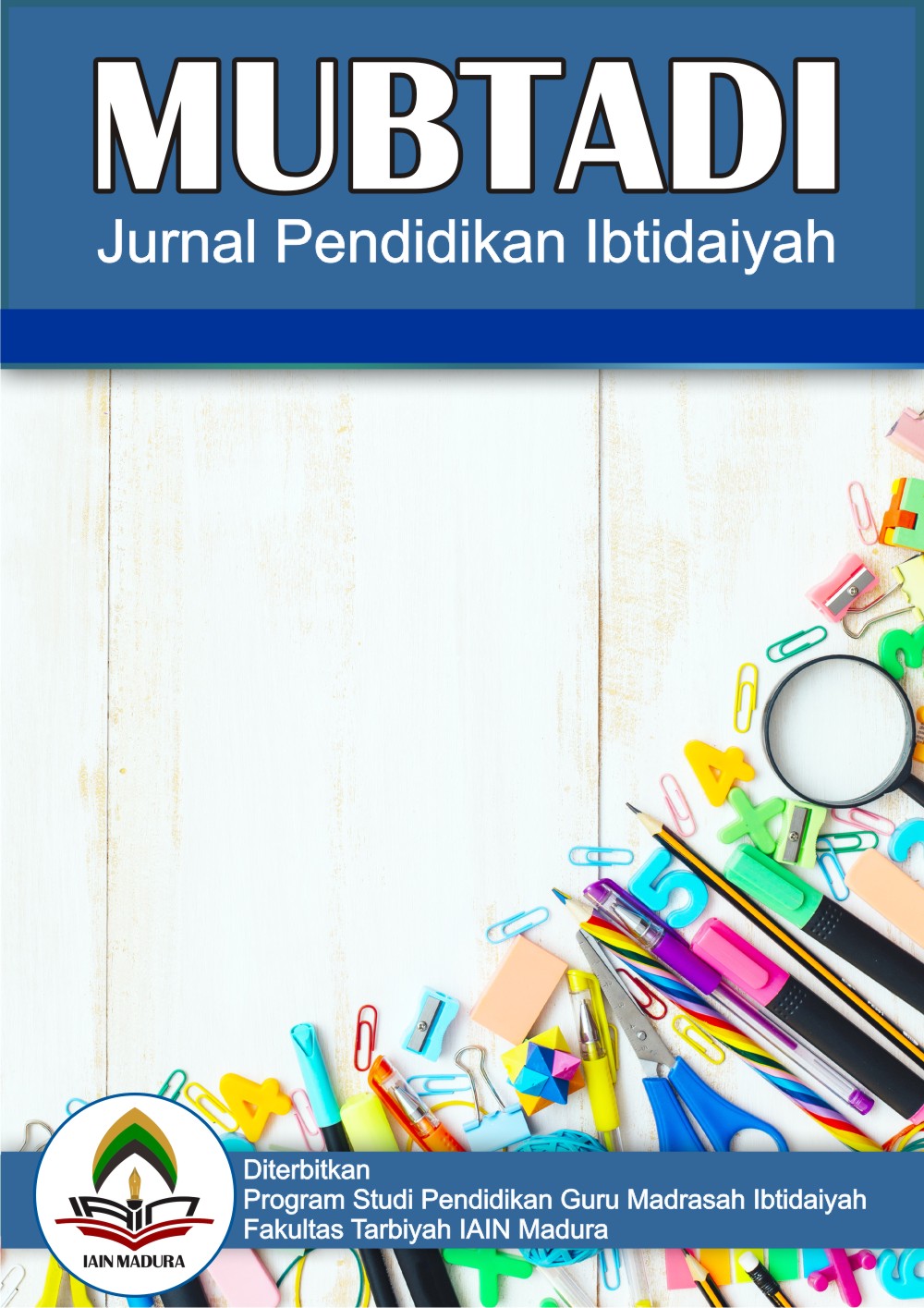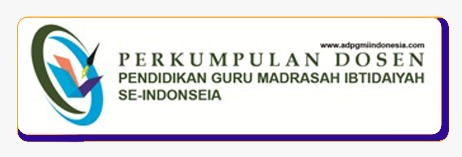IMPLEMENTATION OF CHILD-FRIENDLY SCHOOL PROGRAM FOR FOSTERING A CONDUCIVE LEARNING ENVIRONMENT AT INTEGRATED ISLAMIC ELEMENTARY SCHOOL
 Abstract views: 328
,
Abstract views: 328
,
 pdf downloads: 150
pdf downloads: 150
Abstract
This study aims to describe the implementation of the Child-Friendly School Program to cultivate a conducive learning environment at an Integrated Islamic Elementary School. A qualitative (descriptive) research method was employed, with school administrators, teachers, and students as research subjects. Data collection techniques included observation, interviews, and documentation. Data analysis followed Miles and Huberman's model, comprising Data Reduction, Data Display, and Conclusion Drawing/Verification. Data validity was ensured through triangulation of techniques and sources. Findings reveal that the implementation of the Child-Friendly School Program at Baitul Jannah Integrated Islamic Elementary School fosters a conducive learning environment through physical school arrangements, teacher qualifications, and conducive learning atmosphere. The attractive, comfortable, and colorful classroom arrangement, along with student artwork displays, enlivens classrooms and motivates students to learn. Professional educators employing student-centered teaching methods contribute to students' developmental progress. Interactive, enjoyable, and positive teacher-student interactions in the classroom create a conducive and productive learning environment.
Downloads
References
An, Yunjo, Diana Mindrila, D. Strategies, Yunjo An, and Diana Mindrila. 2020. “Strategies and Tools Used for Learner- Centered Instruction To Cite This Article : Strategies and Tools Used for Learner-Centered Instruction.” International Journal of Technology in Education and Science 4(2):133–43.
Ananda, Ridha Fahmi, Ediwarman Ediwarman, Edi Yunara, and Edy Ikhsan. 2023. “Perlindungan Hukum Terhadap Anak Sebagai Korban Kejahatan Pelecehan Seksual Dalam Perspektif Viktimologi.” Locus Journal of Academic Literature Review 52–65. doi: 10.56128/ljoalr.v2i1.125.
Arfandi, Arfandi, and Mohamad Aso Samsudin. 2021. “Peran Guru Profesional Sebagai Fasilitator Dan Komunikator Dalam Kegiatan Belajar Mengajar.” Edupedia : Jurnal Studi Pendidikan Dan Pedagogi Islam 5(2):37–45. doi: 10.35316/edupedia.v5i2.1200.
Arissa, Yeni. 2022. “Strategi Agen Transfer Kebijakan Tingkat Lokal Menuju Kota Layak Anak.” Jurnal Interaktif 14(1):50–70. doi: 10.21776/ub.interaktif.2022.014.01.5.
Azmiyah, Ulul, and Anita Puji Astutik. 2021. “The Role of The Movement Teacher in Preparing Indonesia’s Excellent Generation.” Nazhruna: Jurnal Pendidikan Islam 4(2):396–408. doi: 10.31538/nzh.v4i2.1582.
Buchner, Tobias, Michael Shevlin, Mary‐Ann Donovan, Magdalena Gercke, Harald Goll, Jan Šiška, Kristýna Janyšková, Joanna Smogorzewska, Grzegorz Szumski, Anastasia Vlachou, Heidrun Demo, Ewald Feyerer, and Deirdre Corby. 2021. “Same Progress for All? Inclusive Education, the United Nations Convention on the Rights of Persons With Disabilities and Students With Intellectual Disability in European Countries.” Journal of Policy and Practice in Intellectual Disabilities 18(1):7–22. doi: 10.1111/jppi.12368.
Christiana, Elisabeth. 2019. “Identifikasi Bentuk Kekerasan Dan Penangannya Di Lingkungan Sekolah Dasar.” Child Education Journal 1(2):58–64. doi: 10.33086/cej.v1i2.1368.
Çoban, Ömür, and Ramazan Atasoy. 2020. “Relationship between Distributed Leadership, Teacher Collaboration and Organizational Innovativeness.” International Journal of Evaluation and Research in Education 9(4):903–11. doi: 10.11591/ijere.v9i4.20679.
Cornivia, Selvi Putri. 2022. “Implementasi Program Sekolah Berbasis Ramah Anak Di Smp Negeri 2 Tuban.” Kajian Moral Dan Kewarganegaraan. 10(3):617–32.
Crosby, R.M. Harden, Joy. 2000. “AMEE Guide No 20: The Good Teacher Is More than a Lecturer - the Twelve Roles of the Teacher.” Medical Teacher 22(4):334–47. doi: 10.1080/014215900409429.
Darma, Surya, Elfrianto Elfrianto, Lamhot Fernando Sianipar, Mhd Fuad Asbi, and Pesta Natalia. 2023. “Implementation of Child Friendly School Governance in Junior High Schools Country 3 Labuhan Deli Satu Atap.” Journal Of Education And Teaching Learning (JETL) 5(1):91–100. doi: 10.51178/jetl.v5i1.1214.
Eko Haryono. 1979. “The Journal of Islamic Studies Petunjuk Penulisan Artikel Jurnal Online.” N-Nuur: The Journal of Islamic Studies.
Erdianti, Ratri Novita, and Sholahuddin Al-Fatih. 2020. “Children Friendly School as the Legal Protection for Children in Indonesia.” Varia Justicia 16(2):137–55. doi: 10.31603/variajusticia.v16i2.3725.
Evianah, Ninik. 2023. “Pentingnya Sekolah Ramah Anak Sebagai Bentuk Pemenuhan Dan Perlindungan Anak.” Jurnal Pendidikan Dan Konseling 5(1):1707–15.
Fahmi, Agus. 2021. “Implementasi Program Sekolah Ramah Anak Dalam Proses Pembelajaran.” Jurnal Visionary (VIS) 6(April):33–41.
Fang, Kailun, Suzana Ariff Azizan, and Huiming Huang. 2024. “GIS-Based Intelligent Planning Approach of Child-Friendly Pedestrian Pathway to Promote a Child-Friendly City.” Scientific Reports 14(1):1–14. doi: 10.1038/s41598-024-58712-5.
Fathatul Jannah, Fillah Babul, and Dian Hidayati. 2022. “Implementation of Child-Friendly School Policies Towards Building the Character of Students in Sd Bantul District.” International Journal of Education Humanities and Social Science 05(05):105–9. doi: 10.54922/ijehss.2022.0443.
Fitriani, Somariah, and Istaryatiningtias. 2020. “Promoting Child-Friendly School Model through School Committee as Parents’ Participation.” International Journal of Evaluation and Research in Education 9(4):1025–34. doi: 10.11591/ijere.v9i4.20615.
Fitriani, Somariah, Istaryatiningtias, and Lelly Qodariah. 2021. “A Child-Friendly School: How the School Implements the Model.” International Journal of Evaluation and Research in Education 10(1):273–84. doi: 10.11591/IJERE.V10I1.20765.
Flores, Maria Assunção. 2020. “Preparing Teachers to Teach in Complex Settings: Opportunities for Professional Learning and Development.” European Journal of Teacher Education 43(3):297–300. doi: 10.1080/02619768.2020.1771895.
Gremmen, Mariola C., Yvonne H. M. van den Berg, Eliane Segers, and Antonius H. N. Cillessen. 2016. “Considerations for Classroom Seating Arrangements and the Role of Teacher Characteristics and Beliefs.” Social Psychology of Education 19(4):749–74. doi: 10.1007/s11218-016-9353-y.
Gulen, M. Fethullah. 2018. Dari Benih Ke Pohon Cedar. Yogyakarta: Republika Penerbit.
Hairina, Yulia. 2016. “Prophetic Parenting Sebagai Model Pengasuhan Dalam Pembentukan Karakter (Akhlak) Anak.” Jurnal Studia Insania 4(1):79. doi: 10.18592/jsi.v4i1.1115.
Hui, Sam C.M. and Cheng, Kenneth K. Y. 2008. “Analysis of Effective Lighting Systems for University Classrooms.” Proceedings of the Henan-Hong Kong Joint Symposium 2008, 30 Jun-1 July 2008, Zhengzhou, China (September):53–64.
Hussin, Nur Hanani, and Ab Halim Tamuri. 2019. “Embedding Values in Teaching Islamic Education among Excellent Teachers.” Journal for Multicultural Education 13(1):2–18. doi: 10.1108/JME-07-2017-0040.
Illahi, Nur. 2020. “Peranan Guru Profesional Dalam Peningkatan Prestasi Siswa Dan Mutu Pendidikan Di Era Milenial.” Jurnal Asy-Syukriyyah 21(1):1–20. doi: 10.36769/asy.v21i1.94.
Inayati, Isna Nurul, and Rima Trianingsih. 2019. “Relevansi Pendekatan Pembelajaran Tematik Integratif Di Sd/Mi Dengan Konsep Madrasah/Sekolah Ramah Anak.” Tarbiyatuna : Kajian Pendidikan Islam 3(2):139. doi: 10.29062/tarbiyatuna.v3i2.264.
J. Mark Halstead. 2007. “Islamic Values: A Distinctive Framework for Moral Education?” Journal of Moral Education 36(3):283–96. doi: 10.1080/03057240701643056.
James, E., J. Willis, and James E. Patton. 2001. “A Survey Study of Elementary Classroom Seating Designs..” Annual Meeting of the National Association of School Psychologists 2–8.
Kilkelly, Ursula. 2020. “The UN Convention on the Rights of the Child: Incremental and Transformative Approaches to Legal Implementation.” Pp. 6–20 in Human Rights Monitoring and Implementation. Routledge.
King, Fiona. 2011. “The Role of Leadership in Developing and Sustaining Teachers’ Professional Learning.” Management in Education 25(4):149–55. doi: 10.1177/0892020611409791.
Koderi, Muhammad Sufian, and Erlina. 2023. “Developing Lampung Local Wisdom Film of Arabic Communication Skills for Madrasah Tsanawiyah Students.” International Journal of Information and Education Technology 13(12):2004–13. doi: 10.18178/ijiet.2023.13.12.2015.
Lian, Bukman, Muhammad Kristiawan, and Rosma Fitriya. 2018. “Giving Creativity Room to Students through the Friendly School’s Program.” International Journal of Scientific and Technology Research 7(7):1–7.
Linneberg, Mai Skjott, and Steffen Korsgaard. 2019. “Coding Qualitative Data : A Synthesis Guiding the Novice Data.” Qualitative Research Journal 19(3):259–70. doi: 10.1108/QRJ-12-2018-0012.
Mabud, Shaikh Abdul. 2018. “The Emergence of Islamic Schools: A Contextual Background.” Pp. 11–33 in Islamic Schooling in the West. Cham: Springer International Publishing.
Mandiudza, Leona. 2013. “Child Friendly Schools.” Greener Journal of Educational Research 3(6):283–88. doi: 10.15580/gjer.2013.6.011813393.
Munawir, Munawir, Zuha Prisma Salsabila, and Nur Rohmatun Nisa’. 2022. “Tugas, Fungsi Dan Peran Guru Profesional.” Jurnal Ilmiah Profesi Pendidikan 7(1):8–12. doi: 10.29303/jipp.v7i1.327.
Novitasari, Ika, and Sunarti. 2023. “Realizing Child-Friendly Schools in The Classroom Learning Process.” Pp. 278–86 in Proceedings of the 2nd UPY International Conference on Education and Social Science (UPINCESS 2023).
Pangestuweni, Ita, Dwi Yuwono Puji Sugiharto, and Noor Hudallah. 2021. “The Implementation of Child-Friendly School Innovation in Al Azhar Islamic Elementary School 60 Pekalongan.” Educational Management 10(3):485–91.
Prasetia, Indra, Emilda Sulasmi, and Susana Susana. 2021. “The Child-Friendly School Program for Developing a Character School in the Primary Schools of Binjai City, Indonesia.” Randwick International of Social Science Journal 2(4):575–82. doi: 10.47175/rissj.v2i4.338.
Purnomo, Budi. 2017. “Analisis Strategi Guru Dalam Pelaksanaan Pengelolaan Kelas Di Sekolah Dasar.” Jurnal Gentala Pendidikan Dasar 2(2):237–55. doi: 10.22437/gentala.v2i2.6809.
Putri, Elsya Derma. 2022. “Kasus Bullying Di Lingkungan Sekolah : Dampak Serta Penanganannya.” Keguruan: Jurnal Penelitian, Pemikiran Dan Pengabdian 10:24–30.
Rahmawati, Farida, and Supriyoko. 2022. “Manajemen Program Sekolah Ramah Anak Dalam Upaya Pembentukan Karakter Siswa Di MAN 4 Bantul Yogyakarta.” Media Manajemen Pendidikan 4(2):182–93. doi: 10.30738/mmp.v4i2.8006.
Rivalina, Rahmi, and Sudirman Siahaan. 2020. “Pemanfaatan Tik Dalam Pembelajaran: Kearah Pembelajaran Berpusat Pada Peserta Didik.” Jurnal Teknodik 73–87. doi: 10.32550/teknodik.v0i2.690.
Rosyad, Ali Miftakhu, and Darmiyati Zuchdi. 2018. “Aktualisasi Pendidikan Karakter Berbasis Kultur Sekolah Dalam Pembelajaran IPS Di SMP.” Harmoni Sosial: Jurnal Pendidikan IPS 5(1):79–92. doi: 10.21831/hsjpi.v5i1.14925.
Safaat, Rheina Aini. 2023. “Tindakan Bullying Di Lingkungan Sekolah Yang Dilakukan Para Remaja.” Jurnal Global Ilmiah 1(2):97–100. doi: 10.55324/jgi.v1i2.13.
Salam, Ramdani, Putri Adibatur Rohmah, Pamuti Pamuti, and Nasarudin Nasarudin. 2023. “Evaluasi Implementasi Sekolah Ramah Anak Menggunakan Pathway Comparison Model.” Journal of Civic Education 6(3):223–29. doi: 10.24036/jce.v6i3.1019.
Samiou, A. I., L. T. Doulos, and S. Zerefos. 2022. “Daylighting and Artificial Lighting Criteria That Promote Performance and Optical Comfort in Preschool Classrooms.” Energy and Buildings 258:111819. doi: 10.1016/j.enbuild.2021.111819.
Sancar, Raziye, Deniz Atal, and Deniz Deryakulu. 2021. “A New Framework for Teachers’ Professional Development.” Teaching and Teacher Education 101:103305. doi: 10.1016/j.tate.2021.103305.
Saptono, Bambang. 2022. “Implications of Child-Friendly School Policies in Reducing Cases of Violence against Children in Elementary Schools.” Jurnal Prima Edukasia 10(1):96–103. doi: 10.21831/jpe.v10i1.45816.
Schuh, Kathy L. 2004. “Learner-Centered Principles in Teacher-Centered Practices?” Teaching and Teacher Education 20(8):833–46. doi: 10.1016/j.tate.2004.09.008.
Setiati, Tri Woro, Dyah Utari, and Yusa Wardhani. 2020. “Visual Confort Evaluation of Specified Class Room (Case Study: Class Room at Tridinanti University of Palembang).” Jurnal Arsir Universitas Muhammadiyah Palembang 4(1):1–8.
Suwarni, Suwarni. 2022. “Peran Budaya Sekolah Dalam Menciptakan Lingkungan Belajar Yang Kondusif.” ITQAN: Jurnal Ilmu-Ilmu Kependidikan 13(2):241–54. doi: 10.47766/itqan.v13i2.197.
Tayefi Nasrabadi, Mahla, Ester Higueras García, and Maryam Pourzakarya. 2021. “Let Children Plan Neighborhoods for a Sustainable Future: A Sustainable Child-Friendly City Approach.” Local Environment 26(2):198–215. doi: 10.1080/13549839.2021.1884668.
Thalib, Mohamad Anwar. 2022. “Pelatihan Analisis Data Model Miles Dan Huberman Untuk Riset Akuntansi Budaya.” Madani: Jurnal Pengabdian Ilmiah 5(1):23–33. doi: 10.30603/md.v5i1.2581.
Theophilus Azungah. 2018. “Qualitative Research : Deductive and Inductive Approaches to Data Analysis.” Qualitative Research Journal 18(4). doi: 10.1108/QRJ-D-18-00035.
Thomas, Shinto, K. Alphonsa Jose, and P. Aneesh Kumar. 2018. “Child Friendly Schools: Challenges and Issues in Creating a Positive and Protective School Environment.” Pp. 233–48 in Positive Schooling and Child Development. Singapore: Springer Singapore.
UNICEF. 2010. UNICEF’S CFS Case Study: Ethiopia. Ethiopia: Addis Ababa.
Widiastuti, Kurnia, Mohamad Joko Susilo, and Hanifah Sausan Nurfinaputri. 2020. “How Classroom Design Impacts for Student Learning Comfort: Architect Perspective on Designing Classrooms.” International Journal of Evaluation and Research in Education 9(3):469–77. doi: 10.11591/ijere.v9i3.20566.
Widodo, Hendro. 2019. “The Role of School Culture in Holistic Education Development in Muhammadiyah Elementary School Sleman Yogyakarta.” Dinamika Ilmu 19(2):265–85. doi: 10.21093/di.v19i2.1742.
Mubtadi: Jurnal pendidikan ibtidaiyah, adalah jurnal yang tidak berbasis komersial. tetapi memberikan lisensi kepada penulis atas karyanya. naskah penulis yang sudah di muat dapat dibuka oleh siapapun dan dapat diperguanakn oleh siapapun dengan catatan berbagi informasi tanpa dipungut baiaya apapun.



.jpg)










